WHO Calls On Govt To Prioritise Hand Hygiene To Protect Health Workers And Patients

By Onoja Baba, Nigeria
As the world observes World Hand Hygiene Day 2025, the World Health Organisation (WHO) has issued a renewed call to governments, healthcare facilities, and health professionals to reinforce hand hygiene practices.
The health organization described it as a simple yet powerful tool to prevent infections and protect both patients and caregivers.
In a statement released on Sunday, the WHO underscored that hand hygiene remains one of the most effective, affordable, and universal methods of infection prevention and control.
The agency urged national policymakers to make hand hygiene compliance a core indicator of health system performance.
The 2025 global campaign is themed *“It might be gloves. It’s always hand hygiene,” a reminder that while medical gloves are essential in clinical settings, they are no substitute for proper hand cleaning.
“Gloves are protective but not foolproof or without problems. They can become contaminated just like hands and are often misused, such as being worn indefinitely between patients or during multiple procedures on the same patient,” the WHO warned.
WHO Director-General, Dr. Tedros Adhanom Ghebreyesus, took to X (formerly Twitter) to highlight the importance of safety in healthcare delivery.
“Nobody should get sick when seeking care and health workers must be able to stay safe while providing care. On #WorldHandHygieneDay, we call on health workers and health facilities around the world to follow safe practices for cleaning hands and using medical gloves,” he said.
Also speaking, Dr. Bruce Aylward, WHO’s Assistant Director-General for Universal Health Coverage and Life Course, reiterated the message that gloves alone are not enough.
“Medical gloves can reduce the risk of infection, but they are never a replacement for hand hygiene. On this World Hand Hygiene Day, let us double down on our commitment and action to improve hand hygiene in healthcare settings,” Aylward stated.
Despite hand hygiene’s critical role in preventing infections, WHO data reveals that two in five healthcare facilities still lack basic hand hygiene services at the point of care.
This gap places an estimated 3.4 billion people at risk of avoidable infections.
Economically, the organisation noted, investing in hand hygiene offers significant returns, every dollar spent can yield up to \$24.6 in benefits.
However, over-reliance on gloves, especially when used improperly, contributes to excessive healthcare waste and environmental damage.
“An average university hospital in a developed country generates 1,634 tons of healthcare waste annually—the equivalent of over 360 African elephants. Much of this could be avoided with proper glove use and hand hygiene,” the WHO noted.
To mitigate these challenges, the global health agency called on countries to align their hand hygiene policies with its guidelines and ensure the availability of clean water, quality gloves, and alcohol-based hand sanitisers in health facilities.
It also recommended training health workers on the five critical moments for hand hygiene and promoting awareness about glove misuse and its consequences.
The WHO concluded by emphasising that clean hands save lives, and recommitting to hygiene in healthcare is a collective responsibility that must be prioritised globally.
categories
recent posts

SOUTH SUDAN: The European Union Reaffirms Support For Media In South Sudan




